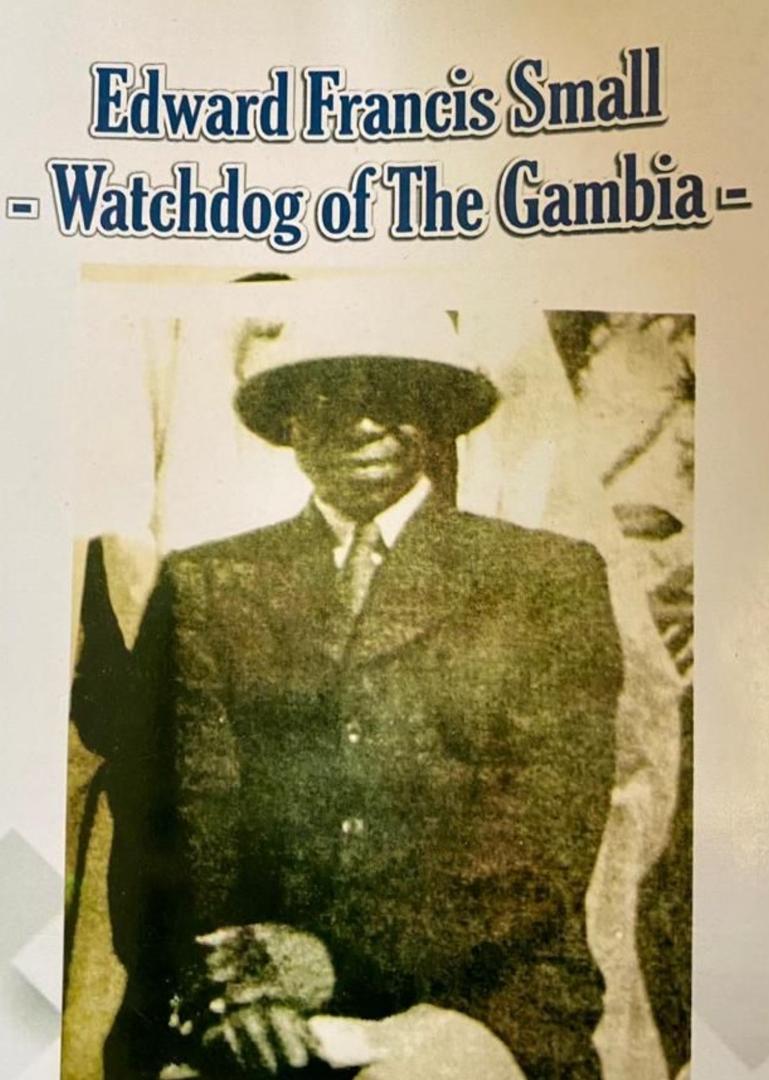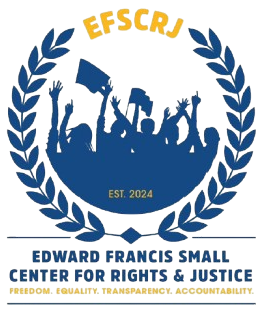About Us
The Edward Francis Small Centre for Rights and Justice is a human rights organization based in the Gambia. The Centre derives its name from the Gambia’s foremost anti-colonial and pro-democracy activist Edward Francis Small known as the ‘Watchdog of the Gambia.’ We are a team of experts and activists from diverse backgrounds dedicated to promoting empowerment, change, and development from a human rights-based approach.
Our Strategic Goal
A Gambia where citizens actively shape governance, institutions serve justly, and human rights are non-negotiable.
Our VISION
An open, just, and equal society where all human beings enjoy freedom unfettered.
Our MISSION
EFSCRJ is dedicated to the promotion and protection of human rights through engaging in capacity building, advocacy and activism methods, research, and forging partnerships. We work with and empower individuals, communities, organizations, and institutions across society to become human rights defenders, promoters, and monitors.
Specific Objectives
We submit to and uphold all human rights principles and standards as the Centre of our management,
governance, operations, and decision-making processes and structures:
Freedom
Ensure fundamental freedoms are upheld without fear of reprisals.
Equality
Eliminate discrimination and promote inclusion in participation and services.
Empowerment
Enhance civic awareness and agency for rights advocacy.
Transparency
Ensure open governance and access to information.
Accountability
Strengthen rule of law and reduce impunity.
Human Rights Pilliar
Our program is founded on 5 human rights pillars: Freedom, Equality, Empowerment, Transparency and Accountability, with the following general objectives
Ensuring Fundamental Freedoms
Promote and defend freedom of expression, media, assembly, association, and movement. Conduct awareness campaigns and legal advocacy for the protection of fundamental human rights. Support civil society organizations in advocating democratic freedoms.
Promoting Equality and Inclusion
Address structural barriers to social and economic inclusion, particularly for marginalized groups. Strengthen legal frameworks that protect against discrimination based on sex, ethnicity, religion, disability, or other statuses. Implement community-driven initiatives to promote representation and equal opportunities.
Empowering Citizens for Change
Enhance civic education through voter education programs and citizen engagement initiatives. Support grassroots movements and community-led advocacy efforts. Strengthen individuals and organizations in human rights, governance, and accountability measures.
Enhancing Transparency and Access to Information
Advocate for open governance policies that ensure public access to laws, institutions, and decision-making processes. Strengthen anti-corruption initiatives through monitoring and reporting mechanisms. Support initiatives that promote internet freedom and digital transparency
Strengthening Accountability and the Rule of Law
Monitor human rights abuses and advocate for legal and institutional reforms. Strengthen mechanisms for law enforcement, accountability, and judicial independence. Support environmental protection policies and combat violence against vulnerable groups through legal interventions.
The Centre is independent. It shall not be under the influence or control of any person, authority or partner nor shall it pursue the personal or partisan interests of any individual or entity. The Centre shall support or oppose issues or entities only in line with its core values and objectives.
The Person Behind the Name of the Centre
Edward Francis Small (29 January 1891 – January 1958) was a Gambian anti-colonial leader and civil rights activist and journalist who began agitating early in his life for workers’ rights and representative democracy in the Gambia and in West Africa. As a civil servant in both the government and the church during the colonial period, EF Small distinguished himself as a freedom fighter when he stood up against the degrading and servile conditions under which Europeans ruled Africans. Because of his resistance to racism and exploitation of colonial rule, Small faced demotions, and dismissals from work as well as incessant harassment as he was described by the colonial authorities as unfit, lacking judgement, courtesy, and self-control, and a communist sympathizer.
Between 1917 to the late 1920s, Small led several protests and wrote several petitions to the British colonial authorities highlighting the injustices meted out to Gambians. Working in the provincial town of Ballanghar he came face to face with the exploitation of local farmers by colonial traders prompting him to immediately come to their defense. Because of his strong belief in rights and justice, EF Small consequently spearheaded the formation of several workers unions and farmer cooperations to secure the rights of workers and ensure fair price for farmers to the chagrin of the British colonizers.

These organizations included the Gambia Farmers’ Cooperative Marketing Association (GFCMA) founded in 1917, the Gambia National Defense Union (GNDU) founded in 1919, and the Bathurst Trade Union (BTU) founded in 1929. These were forerunners, respectively, of the later editions of the Gambia Cooperative Union and the Gambia Labor Union in post-independence Gambia.
In the 1920s, Small also became one of the founding members of West Africa’s anti-colonial elites who founded the sub-region’s premier anti-colonial body, the National Congress of British West Africa (NCBWA) to demand greater participation and representation of Africans in government and the protection of their rights. He called for democracy and the rights of citizens to have a say in the decisions that affect them. Shouting ‘no taxation without representation’ he demanded that since Gambians pay tax therefore Gambians must elect and be elected in institutions in which decisions are made about taxes and the affairs of the people. This is a call for independence and democracy which were the essence and objectives of his struggle.
EF Small was a journalist. With his newspaper, the Senegambia Reporter, Small dedicated his life to the unity of the Gambia and Senegal as Senegambia while also pursuing pan-Africanist ideals. He had connected with other liberation and progressive forces across Africa, Europe, Asia, and the Americas thereby contributing immensely to global movements and achievements for freedom and democracy against colonialism and exploitation. As the repression from the colonial office became unbearable for him in his own country, Small was forced into a self-imposed exile in Dakar to continue his resistance for independence and democracy. Still the colonialists in Dakar will not let him breathe there and in 1923 was forced to move again further to London.
Thanks to his unrelenting resistance, determination and leadership, EF Small eventually returned to his homeland in 1928 after the colonial governor John Middleton extended an olive branch to him. Immediately upon return, Small re-launched his activism, unionism, and journalism activities as he continued to agitate for his long-held ideals: fair price for produce, no taxation without representation, anti-racism, human rights, and Pan-Africanism. Because of his leadership and determination, Small was appointed an unofficial representative in the colonial legislative chamber in 1942. Unsatisfied with the system, Small continued to demand for the creation of representative institutions and in 1947 the Gambia’s first elective city council was created in Banjul. Naturally, EF Small was elected as the first African in the newly created body that year, thereby opening the floodgates for independence henceforth.
We hold that Edward Francis Small was not only the Father of Gambian Independence but also the Father of Trade Unionism, the Premier Human Rights Defender, and Doyen of Activism for justice in the Gambia hence the Watchdog of the Gambia. In recognition of his role and contribution we hold him to be a man worthy of our inspiration and the name of The Centre.
His life and work are a demonstration of his effective strategies and strong leadership qualities that had shaken the colonial establishment to the core. Today, EF Small’s name and memory are immortalized in the name of the country’s main hospital named after him by the Gambia Government in 2013.
By also naming this Centre after him, we are further immortalizing not only his name and legacy, but above all, we are also seeking to provide inspiration and strength to all activists for human rights and justice, unionists for workers’ rights and welfare, advocates for protection of farmers and for fair trade. With his name, the Centre seeks to cultivate many more activists by using his example as education and a sense of direction and purpose to young people in particular.
We wish to continue his life’s work and legacy which are to continue to demand, promote and protect justice, accountability, and democracy in our society and beyond. EF Small lived for these ideals thanks to which the Gambia was able to achieve independence in 1970. By continuing his path, we wish to contribute to making the Gambia, Africa, and the world an even better place where democracy and development will flourish in fulfilment of human rights and justice.
[1] This historical account is adapted from https://dacb.org/stories/gambia/small-edwardf/ which is also adapted from Nana Grey-Johnson’s Edward Francis Small, Watchdog of The Gambia, 3rd ed. (Banjul, The Gambia: Media & Development Specialists Publishing Co. Ltd., 2013).






